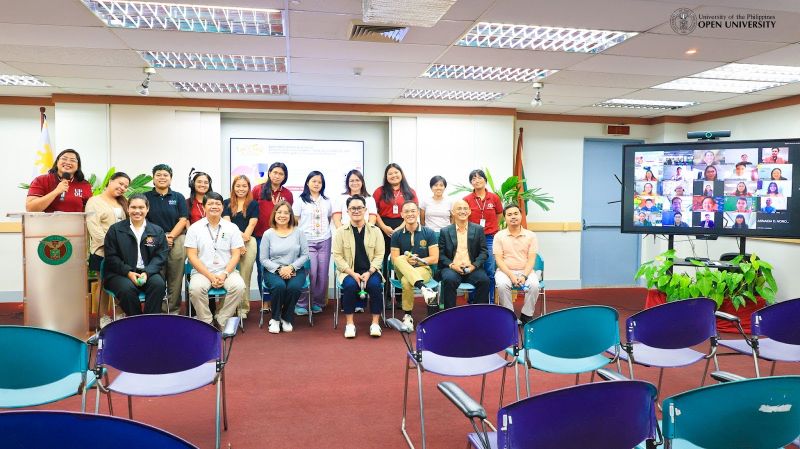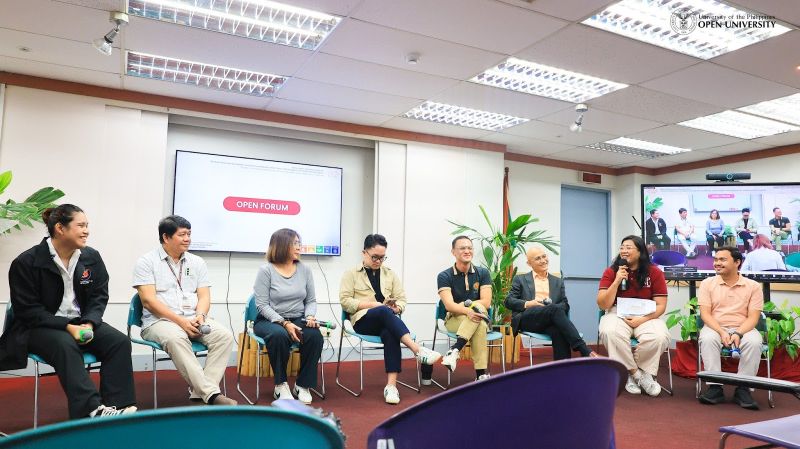
LTIO participants and speakers joined the forum onsite at the UPOU AVR and online via Zoom
The UP Open University (UPOU) Faculty of Management and Development Studies (FMDS) conducted a hybrid webinar entitled “Baha, baha, paano ka ginawa? A Forum Series on Corruption, Social Accountability, and Citizens’ Participation on Flood Control Projects.” The first forum, which dealt with corruption and social accountability within flood control initiatives, was held on 21 October 2025 at the Audio-Visual Room (AVR) at the UP Open University Headquarters, via Zoom and FB Live.
The webinar brought together experts from various fields to build a shared understanding of the issue. FMDS Program Chairs, faculty members, and a community representative discussed the technical, social, environmental, and governance dimensions of flood control and its effects on vulnerable communities.
Dr. Finaflor Taylan, Dean of FMDS, opened the event and emphasized the importance of keeping the conversation on corruption and social accountability alive. She said that such discussions should not end in a single forum but should continue to raise awareness and amplify the voices of the people. Speaking from a social work perspective, she pointed out how vulnerable groups are often the most at risk during crises. She highlighted the importance of inclusive decision-making, where local communities, especially those directly affected, must have a voice in governance and project implementation.
Sangguniang Kabataan (SK) Councilor Francis D. Ajo, representing the Los Baños Kaya Natin Youth (KNY), shared their lived experiences during the recent typhoons that caused severe flooding in Brgy. Mayondon in Los Baños, Laguna. Through actual photos, he showed how flooding disrupts daily life. While LGU efforts offer temporary relief, he emphasized that real solutions require stronger support from higher-ups and active community participation.
Asst. Prof. Lloyd Simporios, FMDS faculty member and Faculty Secretary, drew from his experience in the social welfare sector, acknowledging that flood control projects are well-intentioned but corruption gets in the way, putting people’s safety and dignity at risk. He noted that the least powerful are the first victims and the last to recover when projects fail. He challenged everyone to become active advocates for transparency and accountability.
Asst. Prof. Maria Lourdes Jarabe, UPOU Office of Gender Concerns Director, highlighted the gap between policy, implementation, and actual community outcomes despite increased budgets for flood control. She emphasized that the community’s voices should inspire stakeholders to demand accountability and pursue more sustainable and effective flood management solutions.
Asst. Prof. Remsce Pasahol, a FMDS faculty member, pointed out that a government agency’s failure in one flood control project can have a ripple effect across other projects. He emphasized that accountability is not just about penalizing contractors, but also about ensuring that projects are completed properly and serve their intended purpose. He emphasized that careful planning protects livelihoods and prevents the erosion of public trust in institutions.
Meanwhile, Dr. Ricardo Bagarinao, Program Chair of the Doctor in Sustainability program and UPOU Program Development Associate for Sustainability, introduced a risk-adaptive sustainability approach to flood management. This framework can address the usual challenges of fragmented planning, reactive responses, and limited adaptive capacity at both the local and national levels.
Asst. Prof. Karl Abelard Villegas, Chair of the Diploma in/Master of Environment and Natural Resources Management (D/MENRM) program, presented nature-based solutions (NbS) for flood management and stressed the long-term benefits of working with nature rather than against it.
FMDS Asst. Prof. Edmerson Calungsod discussed TAP (Transparency, Accountability, and Participation) as a framework for ensuring accessibility of public information; accountability of officials and implementers for their actions; and participation of citizens in decision-making processes. He added that sustainable solutions to flooding must also be rooted in integrity and inclusive governance.

Resource speakers during the open forum. L-R: SK Councillor Francis D. Ajo, Dr. Ricardo Bagarinao, Dean Finaflor Taylan, Asst. Prof. Lloyd Simporios, Asst. Prof. Edmerson Calungsod, Dr. Karl Villegas, Ms. Noreen Alazada, Asst. Prof. Remsce Pasahol
The event concluded with an open forum, where the speakers exchanged insights with the audience on encouraging community involvement and raising public awareness to address corruption, accountability, and sustainable flood management. Ms. Noreen Alazada, FMDS Staff member, served as host and moderator of the forum.
Written by Marinela Hernandez | Edited by Primo G. Garcia and Anna Cañas-Llamas | Photos by Anthea Fay Peredo








![[Job Vacancy]
The UP Open University is looking for one (1) University Extension Associate I under the Faculty of Information and Communication Studies (FICS).
For more information, visit upou.edu.ph/job-opportunities/ and submit your application via url.upou.edu.ph/hrapplication on or before 23 February 2026.
#UPOU
#UPOpenUniversity
#JobVacancy](https://www.upou.edu.ph/wp-content/plugins/instagram-feed/img/placeholder.png)